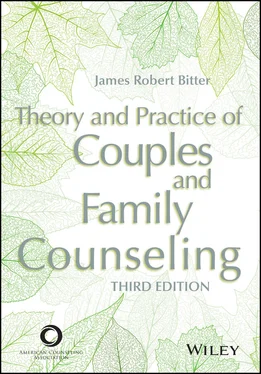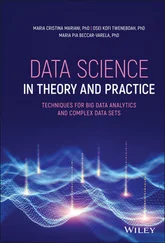James Robert Bitter - Theory and Practice of Couples and Family Counseling
Здесь есть возможность читать онлайн «James Robert Bitter - Theory and Practice of Couples and Family Counseling» — ознакомительный отрывок электронной книги совершенно бесплатно, а после прочтения отрывка купить полную версию. В некоторых случаях можно слушать аудио, скачать через торрент в формате fb2 и присутствует краткое содержание. Жанр: unrecognised, на английском языке. Описание произведения, (предисловие) а так же отзывы посетителей доступны на портале библиотеки ЛибКат.
- Название:Theory and Practice of Couples and Family Counseling
- Автор:
- Жанр:
- Год:неизвестен
- ISBN:нет данных
- Рейтинг книги:5 / 5. Голосов: 1
-
Избранное:Добавить в избранное
- Отзывы:
-
Ваша оценка:
- 100
- 1
- 2
- 3
- 4
- 5
Theory and Practice of Couples and Family Counseling: краткое содержание, описание и аннотация
Предлагаем к чтению аннотацию, описание, краткое содержание или предисловие (зависит от того, что написал сам автор книги «Theory and Practice of Couples and Family Counseling»). Если вы не нашли необходимую информацию о книге — напишите в комментариях, мы постараемся отыскать её.
Theory and Practice of Couples and Family Counseling — читать онлайн ознакомительный отрывок
Ниже представлен текст книги, разбитый по страницам. Система сохранения места последней прочитанной страницы, позволяет с удобством читать онлайн бесплатно книгу «Theory and Practice of Couples and Family Counseling», без необходимости каждый раз заново искать на чём Вы остановились. Поставьте закладку, и сможете в любой момент перейти на страницу, на которой закончили чтение.
Интервал:
Закладка:
Still, people did not present for counseling saying that they had problems with their thinking. They came with feelings of anxiety, depression, fear, panic, worry, anger, and so on. When Ellis would ask people why they felt one way or another, they would often relate it to an activating event, believing that the event caused their feeling. Ellis would challenge this assertion, saying that it was not the event that caused the feeling but the beliefs or thoughts the person had about the event. Every negative feeling (C) is the result of an irrational belief (B) in relation to the activating event (A). Ellis also noted that there was always a B1 and a B2 option in his ABC process. The former was a rational belief that would result in still functional feeling states, and the latter was an irrational belief that would result in disturbing feelings and often dysfunctional behavior. Thus, if the person I am dating breaks up with me (A), and I think that this is the worst, most horrible thing that could happen to me (B2), I will wind up feeling depressed (C). However, if I think that it is unfortunate that this person and I did not work out (B1), I will probably be sad for a while, but life will go on.
Aaron Beck graduated from Brown University and later Yale Medical School at about the same time that Ellis was completing his degrees in clinical psychology. Like Ellis, Beck was initially trained in psychoanalysis, and he set out to study its tenets in relation to people who were depressed and anxious. His studies did nothing to confirm psychoanalysis; rather, they led to an identification of what Beck called automatic thoughts , essentially negative thoughts that people have about themselves, the world, or the future. Beck (1997) noted that people would accept these thoughts as both valid and normal, thoughts they had had all of their lives and that had never been challenged. Beck began to help his patients identify and evaluate these thoughts, to challenge them through thinking more realistically; in doing so, his patients would also report feeling better emotionally and even behaving more functionally. Beck came to believe that cognitive distortions, which he categorized and specified, always had negative effects on behavior, no matter what the disorder. It is for this reason that Beck is considered by many to be the father of cognitive behavior therapy.
In the late 1980s, Beck and colleagues began to address the cognitive schema that were involved in marital discord, and Beck (1988) even went so far as to write a popular book, Love Is Never Enough , to bring cognitive behavioral ideas to those who might be having difficulties in their coupled or spousal relationships.
Beck was always less abrasive than Ellis, and his work found much less resistance among medical and nonmedical professionals when it was introduced. To be sure, his distinguished work at the University of Pennsylvania was based on solid research, and his ideas influenced many important contributors to cognitive therapy, including Martin Seligman, who would develop the concept of learned helplessness. Beck’s careful development of the model and instruments of assessment made it hard to argue with his outcomes. In the field of psychotherapy, Beck’s cognitive behavioral approach is now the most researched method of counseling: It is the model to which most people refer when they are concerned about evidence-based practice.
Beck’s daughter, Judith Beck, would also join her father in developing the model and creating the Beck inventories for depression, hopelessness, and anxiety for both adults and youth. Today Judith Beck is the president of the Beck Institute near Philadelphia, an institute she and her father started in 1994.
Cognitive Behavioral Family Counseling
A former student of both Joseph Wolpe and Aaron Beck, Frank Dattilio (2010) has centered his cognitive behavioral scholarship and practice in work with couples and families. Others practicing cognitive behavioral family counseling, like Norman Epstein and Donald Baucom, also address the emotional dynamics of couples and families, but it is really Dattilio who brings a systemic focus to family interventions, starting with an assessment of cognitive schema in families of origin, acknowledging the importance of attachment theory and the neurobiology of the mind, and bringing cognitive behavioral interventions into mutually sustainable interactions and family patterns.
Parenting in the 21st Century
It is important to remember that concerns about effective parenting have only been around for a little over 75 years. In the 1940s, psychologists began to think of children as developing people. Before that, children were just beings who took an enormously long time to reach maturity, and raising them was largely the province of women who were also subject to the will of their husbands. Autocratic and authoritarian homes were the norm.
In the 1920s, 50% of the population still lived in rural, largely farming, areas, and children were needed as farmhands; 20 years earlier that percentage had been 70%. This was the decade in which John Watson performed his famous experiment with Little Albert, thinking of him only as a subject he had purchased from Albert’s mother. Toward the end of the 1920s, Watson (1928) would publish Psychological Care of Infant and Child based on a series of articles he had written for popular magazines at the time. This is really the first book ever published on childcare, and in it Watson essentially advocated that children be treated like little adults.
At this same time in Europe, Adler was beginning to talk about the need to understand children on the basis of the goals that they sought. His work with families in open forums was based on disclosing these goals to children in a manner that they could understand and then using encouragement as a means of bringing children into more harmony with parents and teachers. One of his students, and later colleague, Rudolf Dreikurs, would bring this model to the United States, and in the 1940s he would propose a comprehensive model for raising children.
At the end of World War II, John Bowlby began to study infants and children who had been separated from their parents during the war. It was during this time that he developed attachment theory, a model that more than 70 years later is now the foundation for the neuroscience of psychoanalysis (Schore, 2012) and the parenting of William Sears (Sears & Sears, 2001).
In 1948, Dreikurs (1948/1992) wrote The Challenge of Parenthood . In this book, Dreikurs specified the four goals of children’s misbehavior, and he developed a process for raising children based on mutual respect, the use of natural and logical consequences instead of punishment, and the use of encouragement instead of praise. Dreikurs’s proposals were democratic in the same sense of the term used by John Dewey (1916/2011) with regard to education. In 1964, Dreikurs and Vicki Soltz would more thoroughly detail this model with specific parental responses to the most common parenting concerns. Their book, Children: The Challenge (Dreikurs & Soltz, 1964), is still one of the most purchased books on parenting ever. It is in this book that Dreikurs differentiated between autocratic and authoritarian approaches, permissive approaches, and what he called a “democratic” approach to parenting. In 1968 and again in 1971, Diana Baumrind independently also delin- eated these same options: authoritarian, permissive, and authoritative-responsive (Baumrind, 1968, 1971).
Today authoritative-responsive parenting is considered the foundation of effective parenting. It is also the basis of the most popular parenting programs in the United States, including Positive Discipline (Nelson, 1981/2006), STEP: Systematic Training for Effective Parenting (Dinkmeyer et al., 1997), Active Parenting (Popkin, 1993), and Total Transformation (Lehman, 2004). STEP started with the work of Rudolf Dreikurs and also incorporates the parenting communications model created by Thomas Gordon (1970). Gordon was a student of Carl Rogers, and his model includes a generous dose of empathic responses called active listening and the use of “I”-messages.
Читать дальшеИнтервал:
Закладка:
Похожие книги на «Theory and Practice of Couples and Family Counseling»
Представляем Вашему вниманию похожие книги на «Theory and Practice of Couples and Family Counseling» списком для выбора. Мы отобрали схожую по названию и смыслу литературу в надежде предоставить читателям больше вариантов отыскать новые, интересные, ещё непрочитанные произведения.
Обсуждение, отзывы о книге «Theory and Practice of Couples and Family Counseling» и просто собственные мнения читателей. Оставьте ваши комментарии, напишите, что Вы думаете о произведении, его смысле или главных героях. Укажите что конкретно понравилось, а что нет, и почему Вы так считаете.












